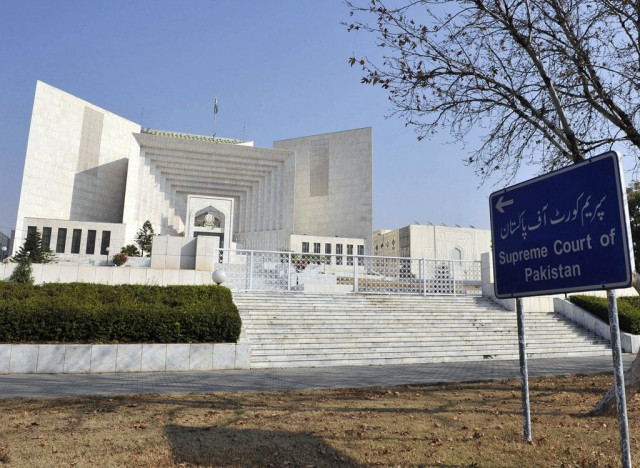Death penalty: Supreme Court dismisses plea of two prisoners
The accused were awarded death sentences for the offence of zina on June 24, 1998

The Supreme Court of Pakistan. PHOTO: AFP
Abid Maqsood and Sanaullah filed a constitutional petition through their counsel, Muhammad Arshad Bhatti, regarding their release after spending 17 years in prison.
The accused were awarded death sentences for the offence of zina on June 24, 1998. Earlier, their appeals were dismissed by the High Court as well as the Supreme Court.
The petitioners contended that their death sentence has not been executed by the executive and they served more than life imprisonment. They added as per settled law, no person can be convicted twice.
The petition of the death row prisoners stated they were convicted in a Hudood case and cannot be treated similar to those accused in anti-state activities.
“Delay in non-execution of death sentence is not on the part of the accused because they are in death cells for more than 17 years. If death is not executed, this delay is on the part of the executive. So delay of non-execution of the death sentence cannot deprive the petitioner from benefit of Article 13 of the constitution.”
Further, it is stated that both the prisoners had filed mercy petitions before the president but their plea is still pending.
Now, the Supreme Court registrar’s office has objected that the petitioners have not exhausted the proper remedy available to them under the law after the dismissal of their petitions.
It further states that the petition pertains to an individual grievance; therefore, original jurisdiction of the court cannot be invoked by filing a constitutional petition under Article 184 (3) of the Constitution.
Military courts
Meanwhile, the Supreme Court on Saturday refused to entertain a plea requesting the court to reconsider its 1999 verdict in the Sheikh Liaquat Hussain case, which declared military courts unconstitutional.
A habitual petitioner and Awami Himayat Tehreek Chairman Maulvi Iqbal Haider on December 28 filed a constitutional petition under Article 184 (3) of the Constitution, requesting the court to revisit its earlier verdict and empower the government, in view of the prevailing circumstances, to make laws or promulgate ordinances to establish military courts in order to help civil authorities curb terrorism and militancy.
However, the Supreme Court registrar’s office on Friday raised four objections and returned the petition.
The registrar’s office objected that the petitioner has no locus standi to file the constitutional petition and did not point out which fundamental rights of public importance have been violated in the recent case.
The office has also suggested the applicant approach a proper forum to redress his grievances.
Following this, on Saturday, the petitioner filed an appeal against the objections raised by the registrar’s office, claiming he, in fact, has the locus standi to file this petition. His appeal will now be fixed before a judge in chamber.
In 1999, a nine-judge Supreme Court bench, headed by then chief justice Ajmal Mian, had declared Ordinance No XII of 1998 illegal. The ordinance was promulgated by Nawaz Sharif’s government and challenged in court by Sheikh Liaquat Hussain.
The ordinance sought to establish special military courts in Sindh in the wake of a wave of terrorism that haunted Karachi in the mid-90s.
Not only did the Supreme Court hold that military courts were illegal but also laid down a set of guidelines with directions to entrust all terrorism-related cases to anti terrorism courts (ATCs), formed under the Anti Terrorism Act (ATA) of 1997. The court had also ordered that ATCs only be assigned one case at a time and no other cases could be referred to them until a verdict was announced on the case at hand.
The guidelines also called upon special courts to proceed on a day-to-day basis and deliver a verdict within seven days, as already provided in the ATA. The case's charge sheet, the guidelines said, should only be submitted once all necessary preparations were in place and that all witnesses should be produced as and when required by the ATC.
As per the guidelines, any appeal arising out of an ATC order would also be heard by the appellate forum within seven days from the filing of appeal and any lapse on part of the investigating and prosecuting agencies shall entail immediate disciplinary action.
Recently, sensing the gravity of the situation, Chief Justice Nasirul Mulk summoned a meeting of all provincial chief justices on December 24, where it was decided that terrorism cases would be given priority and would be heard on a daily basis.
But in his petition, Iqbal Haider asked the court to issue a new set of guidelines after re-visiting the 1999 judgment, in the larger public interest. He claims citizens are now hostage to the nefarious designs of terrorists, who strike anywhere at will depriving citizens of their fundamental rights.
The petitioner contends that until prosecuted by the military courts, those involved in the brutal murders of innocent people could not be brought to justice.



















COMMENTS
Comments are moderated and generally will be posted if they are on-topic and not abusive.
For more information, please see our Comments FAQ